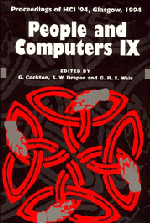Book contents
- Frontmatter
- Contents
- Preface: HCI'94 – You Probably Haven't Seen It All Before
- Part I Invited Papers
- Part II Methodology of Interactive Systems Development
- 3 Transferring HCI Modelling and Design Techniques to Practitioners: A Framework and Empirical Work
- 4 The Use of Visual Indexing as an Interview Support Technique
- 5 A Domain Analysis of Air Traffic Management Work can be Used to Rationalise Interface Design Issues
- 6 Manuals as Structured Programs
- 7 Improving Education through Computer-Based Alternative Assessment Methods
- 8 Visual Programming in a Visual Domain: A Case Study of Cognitive Dimensions
- 9 Evaluating Evaluation Methods
- Crafting Interaction: Styles, Metaphors, Modalities and Agents
- Modelling Humans, Computers and their Interaction
- Notations and Tools for Design
- Part VI Computer-Supported Cooperative Work
- Author Index
- Keyword Index
7 - Improving Education through Computer-Based Alternative Assessment Methods
Published online by Cambridge University Press: 04 August 2010
- Frontmatter
- Contents
- Preface: HCI'94 – You Probably Haven't Seen It All Before
- Part I Invited Papers
- Part II Methodology of Interactive Systems Development
- 3 Transferring HCI Modelling and Design Techniques to Practitioners: A Framework and Empirical Work
- 4 The Use of Visual Indexing as an Interview Support Technique
- 5 A Domain Analysis of Air Traffic Management Work can be Used to Rationalise Interface Design Issues
- 6 Manuals as Structured Programs
- 7 Improving Education through Computer-Based Alternative Assessment Methods
- 8 Visual Programming in a Visual Domain: A Case Study of Cognitive Dimensions
- 9 Evaluating Evaluation Methods
- Crafting Interaction: Styles, Metaphors, Modalities and Agents
- Modelling Humans, Computers and their Interaction
- Notations and Tools for Design
- Part VI Computer-Supported Cooperative Work
- Author Index
- Keyword Index
Summary
Assessment contributes to the educational process of students but only a small fraction of the full potential is typically realized. The primary impediment to realizing greater benefit is the infeasibility of implementing more effective alternatives in the resource-limited settings typical of modern educational environments. We are developing a system architecture that exploits hypermedia technology to overcome serious limitations of traditional assessment methods.
The architecture addresses the design of cost-effective confidence-measuring and performance-testing assessment vehicles using hypermedia-based studentsystem interaction. In this paper we describe the conceptual foundation, its embodiment in prototypes, and preliminary results from classroom tests.
Keywords: educational assessment, hypermedia, computer-assisted education.
Introduction
The educational experience can be enhanced by using assessment methods as techniques for evaluation and as guides for instructors and administrators in curriculum design and teaching methods (Airasian, 1991). Unfortunately, standardized assessment methods do not discriminate between finer-grained states of knowledge nor do they adequately reflect the ability of students to apply what they've learned. In addition, since the assessment instrument significantly influences instruction, alternative assessment methods are needed to better address fundamental educational goals. Past attempts to address these problems and goals on a large scale using traditional technology have proven infeasible primarily due to the high costs of providing adequate, standardized materials and controlled, responsive environments. In this paper we present alternatives that exploit the characteristics of modern hypermedia-capable computer systems to achieve the desired goals in a cost-effective way.
- Type
- Chapter
- Information
- People and Computers , pp. 81 - 90Publisher: Cambridge University PressPrint publication year: 1994



